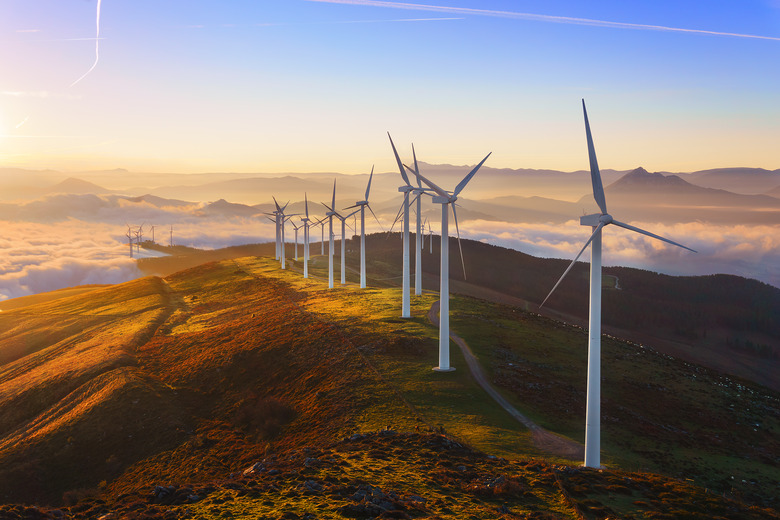What Is The Importance Of Energy Sources?
The topic of the importance of energy sources is a conversation that will continue over the next few decades as more people begin to realize the value of utilizing renewable energy as opposed to getting energy from sources that don't naturally regenerate. Nonrenewable energy sources include fossil fuels that come from beneath the ground and take thousands of years to form. Renewable energy sources regenerate quickly and can supply a region with its long-term energy needs far into the future.
TL;DR (Too Long; Didn't Read)
The importance of energy sources, such as renewable versus nonrenewable ones, remains undeniable as humans continue into the 21st century. When crude oil, a form of nonrenewable energy, will disappear in about 50 years, people will need alternative energy sources to power their homes and their vehicles. This presents a clear argument in favor of the importance of developing nonrenewable energy sources sooner rather than later.
Nonrenewable Energy Sources
Nonrenewable Energy Sources
Not all nonrenewable energy sources come from fossil fuels. Uranium forms as mineral deposits and is a nonrenewable energy source mined from underground locations that becomes fuel for use at nuclear power plants. Fossil fuels such as hydrocarbons consist of coal, crude oil, fuel oil, and natural gas formed from the carcasses of dead plants and animals. Because all these fuels don't replenish in the short term, taking eons to form, scientists consider them nonrenewable.
Renewable Energy Supplies
Renewable Energy Supplies
Renewable energy comes from sunlight, wind, geothermal, moving water, biomass and biofuels. Environmentalists tout the importance of renewable energy sources because they represent clean energy with a lower impact on nature. Clean energy sources also cost less: The power source is free, and it costs less to install a wind turbine or a solar array than it does to drill for oil. Wind and sun don't disappear with use, as they continually regenerate. Hydroelectric plants on dams and rivers can generate a significant amount of electricity and will continue to do so as long as water continues to flow. Other sources include fuels like ethanol. It comes from plants and the energy of heat generated by wood burning. Inventors and scientists have also found ways to generate power from the force of the waves in the ocean.
Impact and Disappearance of Fossil Fuels
Impact and Disappearance of Fossil Fuels
Fossil fuels have a serious impact on the environment as noted by climatologists across the globe. It takes money to extract them from the ground, process them for use and transport them to the end consumer. Fossil fuels add C02 and other greenhouse gases to the air during each one of these stages. They also stay trapped in the atmosphere and affect the global climate. Other problems include groundwater contamination from fracking, increased earthquakes in fracked regions, and sinkholes that occur due to oil drilling.
Not everyone benefits from fossil fuel, as it costs more in third world countries than locals can often afford. Assumptions by researchers at Stanford University estimate that in 113 years all the coal will be gone. Natural gas will disappear in 52 years, and crude oil will mostly disappear in 50 years. These assumptions point to the importance of nonrenewable energy sources.
References
- U.S. Energy Information Administration: Nonrenewable Energy Explained
- Carleton University: Uranium Deposits
- Bureau of Ocean Energy Management: Ocean Wave Energy
- Stanford University: Tick Tock: Fossil Fuel Reserve Estimates
- Inside Climate News: Fracking Study Finds Toxins in Wyoming Town's Groundwater and Raises Broader Concerns
- Forbes: Thanks To Fracking, Earthquake Hazards In Parts Of Oklahoma Now Comparable To California
- Tulane University: Subsidence: Dissolution & Human Related Causes
Cite This Article
MLA
Brenner, Laurie. "What Is The Importance Of Energy Sources?" sciencing.com, https://www.sciencing.com/importance-energy-sources-6391828/. 24 April 2018.
APA
Brenner, Laurie. (2018, April 24). What Is The Importance Of Energy Sources?. sciencing.com. Retrieved from https://www.sciencing.com/importance-energy-sources-6391828/
Chicago
Brenner, Laurie. What Is The Importance Of Energy Sources? last modified March 24, 2022. https://www.sciencing.com/importance-energy-sources-6391828/
